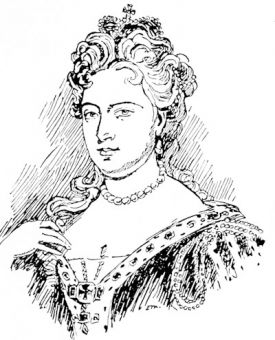
Walpole, then, ruled the country for nearly nineteen years, and continued nominally at the head of affairs for nearly three years after he had lost the real control. With the exception of Lord Burleigh before him, and the younger Pitt after him, no other minister has held the chief power in the state for so long a time continuously or almost continuously.
He retained the support of the Crown throughout that time, in spite of the fact that George I and his heir were in constant antagonism, and it was generally expected that the accession of George II would be followed by a complete change of ministers.
Walpole mainÂtained his position because he was shrewd enough to know that the person who exercised the strongest influence over the mind of George II was his very able queen, Caroline of Anspach. Walpole's rivals made the blunder of seeking alliance with the king through other ladies who enjoyed the royal reÂgard.
But the latitude of George's morals did not disturb his wife's ascendency; Walpole allied himself with Queen Caroline, and that alliance secured him with the king. His power was notably diminished when Queen Caroline died in 1737.
Walpole managed his colleagues by overriding them If they set themÂselves up as rivals or attempted to defy his authority, they ceased to be his colleagues. At the end of his tenure of power every man of dangerous abilities or overweenÂing ambition had joined the OpposiÂtion, an Opposition united only in its antagonism to the minister. Walpole wanted not colleagues but subordinates, and he was strong enough to conduct the government through the mediocre subordinates who obeyed orders.
The Value of Corruption...
The management of parliament was more complicated; the method was corruption. Corruption could be applied in one form or another to individual members of parliament, to the magnates who controlled the elections in certain constituencies, and to the electorate itself in other constituencies.
County members were returned by the independent votes of landowners, and here direct corruption was hardly available, except so far as it might procure the favourable influence of great county families. Of the boroughs a great number had already become in effect the property of some great magnate whom the voters could not venture to offend.
Both Tudors and Stuarts had added to the number of boroughs small towns especially in Cornwall, which practically acted under orders from the Crown. In other boroughs of magnitude the parliamentary elections were virtually controlled by the corporation, and corporations were corÂruptible, even to the extent of openly selling the seat to the highest bidder.
Individual members of parliament were corruptible. "All these men have their price," said Walpole as he surveyed the benches of the House of Commons, a remark which has been popularly translated into the saying, "Every man has his price."
The price of course was not necessarily cash; but Walpole acted without scruple on the general principle that votes in the House were to be bought, that the support of magnates was to be bought, and that the support of corporations was to be bought.
Official places big and small were distributed for the satisfaction of influential persons. Hard cash passed when hard cash was required. Walpole did not create the system; Danby has a better title to the honour of having originated it; as compared with his successors, Walpole was a mere dabbler; still it was he who educated the public conscience into regarding corruption as a matter of course. No man ever bribed Walpole himself; in that sense his hands were conspicuously clean; but he was entirely without shame in his corruption of others. And thus he managed parliament.
Public Opinion
But there still remained a latent force which no ministry could withstand if it were roused to activity, the force of public opinion. Ministers have often achieved and not so often retained power by awakening popular enthusiasm.
Walpole and his school dreaded popular enthusiasm as a disturbing and unsettling factor. His great object was to prevent ebullitions of sentiment, to preserve an acquiescent apathy in the public, to "let sleeping dogs lie." For more than eighteen years he carried out that policy successfully, though sometimes at the cost of surrendering measures which he regarded as being in themselves for the public good.
After eighteen years it was a rush of popular feeling which swept him away, although he would not resign the helm which he could no longer control. During those years his policy had consistently preserved the country at peace, while the storms of war swept over the continent. British commerce expanded under his enlightened financial administration.
The nation piled up wealth which was to stand it in good stead. But the pursuit of material wealth as the summum bonum, the cultivation of moral indifferentism, the total divorce of politics from all idealism, threatened to debase the national character, until nobler leaders than Walpole reawakened a nobler spirit.
This article is excerpted from the book, 'A History of the British Nation', by AD Innes, published in 1912 by TC & EC Jack, London. I picked up this delightful tome at a second-hand bookstore in Calgary, Canada, some years ago. Since it is now more than 70 years since Mr Innes's death in 1938, we are able to share the complete text of this book with Britain Express readers. Some of the author's views may be controversial by modern standards, particularly his attitudes towards other cultures and races, but it is worth reading as a period piece of British attitudes at the time of writing.
History
Prehistory - Roman
Britain - Dark Ages - Medieval
Britain - The Tudor Era - The
Stuarts - Georgian Britain - The Victorian Age